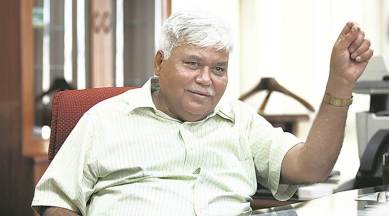IUC should not be a profit vertical for telecom companies: TRAI chairman R S Sharma
Trai chairman R S Sharma, in an interview with The Indian Express, pointed out that IUC should not be seen as a “profit vertical” by telecom companies, and consequently should not have any impact on the stressed sector.

Last week, the Telecom Regulatory Authority of India (Trai) came out with a regulation slashing the interconnect usage charge (IUC) by 57 per cent to 6 paise per minute. This created a hue and cry in the telecom industry, a part of which expects their already stressed financials to be hurt even more due to the decision. Trai chairman R S SHARMA, in an interview with The Indian Express, pointed out that IUC should not be seen as a “profit vertical” by telecom companies, and consequently should not have any impact on the stressed sector. Edited excerpts:
In your opinion, should IUC be seen as a source of revenue by telecom operators?
monthly limit of free stories.
with an Express account.
Certainly not. My view is that IUC cannot be a profit vertical for any company. IUC should be cost-based and that is what we have tried to do in the computation for our current regulation. We have been extremely transparent so much so that we have published the methodology and the cost sheets as annexure to the explanatory memorandum, which is actually set out on the basis of the data provided by the telecom service providers themselves. That’s one part — in fact, we have taken the figures for December 2016. We did not take the current figures because that would probably have been even less than 6 paise per minute. We did not do that because we thought that we shouldn’t extrapolate and have done it in a meticulous manner.
How do you respond to the argument of some of the operators that IUC will further stress the telecom sector, which is already debt-ridden?
It has nothing to do with the stress in the telecom sector. If the particular handling of a call is not a profit vertical for you, how does it contribute negatively or positively to the stress for any operator. If 6 paise is less than my cost, definitely it will hurt me. The more calls I handle, the more it will hurt me. If it is more than my cost, it will benefit me. But if it is meant to exactly pay for my cost, why should it hurt me?
In other markets where IUC is nil, incoming calls are chargeable in one way or the other. Do you think that the bill and keep model could usher in a paid incoming regime in India once again?
What we’re saying is that in the ‘calling party pays’ regime, once the networks have become data-centric and voice has become an application, the cost will come down. For a 4G VoLTE call, the cost is insignificant. What happens is that voice becomes an application that runs on data. ‘Bill and keep’ has got two words, if bill itself is zero, and it is insignificant enough to be built and reconciled. Therefore, we think that by January 1, 2020, cost will become next to zero, which is why bill and keep has been proposed. Some have argued that for computation of IUC, Trai has applied the methodologies that have been applied in developed markets, and that no developing economies have applied it. But India is not a developing market in terms of telecom. In telecom and IT, India is a leader. It is the second-largest telecom market.
Do you think the Trai’s decision could catalyse the adoption of VoLTE by operators?
Certainly. We are trying to nudge the market in that direction. Not VoLTE or any particular technology, but IP-based technology. Right now, the back-end of all telecom providers is IP. Secondly, major telecom operators have already announced their plans for VoLTE. Therefore, this adoption should accelerate. For Digital India to succeed, data will have to be the raw material. Everything else will have to be a by-product of data. You may convert data into voice, text, pictures, or video.
One of your predecessor at Trai has been critical of the decision and said that it gives an edge to one of the stakeholders. Your comments?
One respects their wisdom in public policy, administrative experience, and that certainly gives them a huge right to express their views, but it certainly does not give them any right to call any entity or any individual dishonest. This is not fair. They can say that the decision is bogus, but can’t say that it is manipulated or that Trai arrived at the 6 paise per minute figure and did a back calculation, which means that they’re telling that we are dishonest. We did not take any decision on the basis of who it is going to benefit or not benefit. We believe IUC should not be a profit vertical, and we made the decision objectively with all the computations being in the public domain. Any decision is bound to benefit somebody even if you are an arbitrator, court, or regulator. It will hurt somebody, and it will benefit somebody. Does that mean you will impute motives to a regulator? That’s not fair. I agree that the stakes are high.